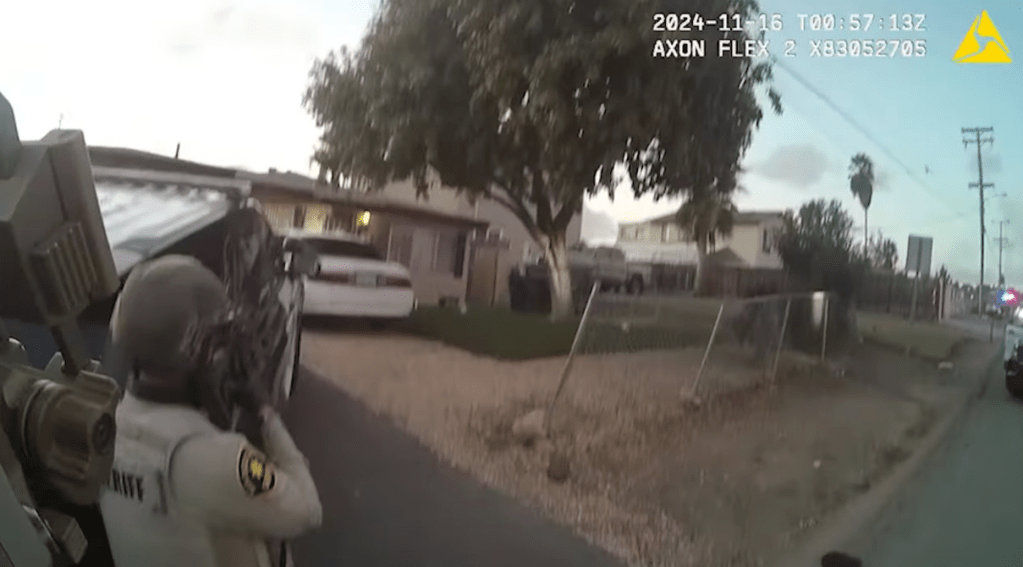The family of a mentally ill man who was shot and killed last year by sheriff’s deputies after showing up with a gun at his ex-girlfriend’s Spring Valley home has filed a wrongful death and excessive force lawsuit against the county and the seven deputies who opened fire.
The lawsuit, filed last week in San Diego federal court, claims that 34-year-old Victor Rendon Jr. “began to bring the firearm up to his own head” and was not pointing it toward the deputies when they shot and killed him in November at a home in the La Presa area.
The San Diego County Sheriff’s Office, in edited video footage of the shooting released last year, said Rendon pointed the gun at deputies after he had earlier fired multiple rounds in an unknown direction. The county District Attorney’s Office also declared that Rendon “raised and pointed the firearm toward the deputies,” according to a review released Thursday that found the deputies bear no state criminal liability.
Filed by Rendon’s minor son and father, the lawsuit alleges excessive force and wrongful death, among other claims. It also contends the county failed to properly train the deputies and maintains policies or customs that are unconstitutional.
The suit seeks damages in excess of $20 million.
“It’s a situation where there’s a lot (the deputies) could have done for somebody who was clearly having a mental health crisis, but instead they treated it like an armed standoff and opened fire at the first sign of provocation they thought they saw,” the family’s attorney, David Finn, said Monday. “He didn’t have to die.”
The county and the Sheriff’s Office, which do not typically comment on pending litigation, did not respond to requests for comment.
The shooting occurred the evening of Nov. 15 after Rendon’s ex-girlfriend called 911 to report he showed up unannounced and entered her home on Leland Street, according to audio of the 911 call previously released by the Sheriff’s Office. The woman said Rendon had a gun and she didn’t feel safe with him there, though she also stated twice that “he’s not trying to hurt me with it.”
She described Rendon as “disoriented and under the influence of something,” said that he had “mental issues” and reported that he was talking to voices in his head, according to the 911 recording. She said she was outside the home, but her children were still inside.
According to the Sheriff’s Office, deputies arrived and safely retrieved the children after Rendon exited onto the back patio area. Over the next few hours, the deputies tried to convince Rendon to surrender, but he “showed no indication of compliance” and at least once appeared to smoke narcotics on the back patio, according to the Sheriff’s Office video and the district attorney’s review.
Footage released by the Sheriff’s Office showed that for a period of about 30 minutes toward the end of the standoff, Rendon went in and out of the home’s front door multiple times while deputies crouched behind vehicles with their weapons trained on him.
The Sheriff’s Office said last year that upon exiting the home one final time, Rendon raised his pistol toward the deputies, who shot and killed him. One video provided by sheriff’s officials, taken from a deputy’s helmet-mounted camera, does not show clearly the moment Rendon allegedly raised the weapon. Footage from a sheriff’s helicopter showed Rendon raising his arm, but the grainy video does not show clearly whether the gun went toward deputies or his own head.
The lawsuit alleges the seven deputies combined fired at least 30 shots at Rendon, striking him at least 10 times.
“Based on the number of shots fired, the Defendants appeared to engage in ‘contagious fire,’” the lawsuit alleges, contending that such an act constitutes excessive use of force and violates the sheriff’s use-of-force policy, California law enforcement guidelines, state statutes and the U.S. Constitution.
The lawsuit also alleges the deputies should have called out the county’s Psychiatric Emergency Response Team, known as PERT, but failed to do so despite being aware that Rendon “suffered from serious mental health issues … that required immediate care and treatment.”
In its review of the case, the District Attorney’s Office found the deputies “reasonably believed Rendon presented an imminent threat of death or serious bodily injury. A reasonable officer in the same situation similarly would perceive Rendon’s actions as a threat that had to be instantly confronted and addressed.”
The county has not yet responded to the lawsuit in court.
Originally Published: July 8, 2025 at 5:04 PM PDT
